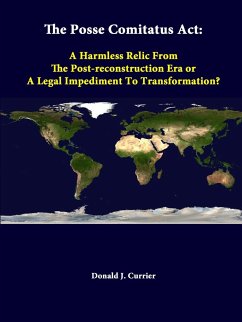Nicht lieferbar

The Military, Domestic Law Enforcement, and Posse Comitatus
A Time for Change
Versandkostenfrei!
Nicht lieferbar
In 1981 the U. S. military began assuming a greater role in the war on drugs, on both the domestic and international fronts. Since that time, the supporting role has dramatically increased and active military involvement along American borders is now commonplace. The Posse Comitatus Act of 1878 (PCA) has served as the primary statutory guard against the use of the U.S. military in domestic law enforcement. With this increased military participation in a number of domestic incidents, questions concerning whether these actions violate the Act or require changes to it continue to challenge policy...
In 1981 the U. S. military began assuming a greater role in the war on drugs, on both the domestic and international fronts. Since that time, the supporting role has dramatically increased and active military involvement along American borders is now commonplace. The Posse Comitatus Act of 1878 (PCA) has served as the primary statutory guard against the use of the U.S. military in domestic law enforcement. With this increased military participation in a number of domestic incidents, questions concerning whether these actions violate the Act or require changes to it continue to challenge policymakers. This paper addresses these questions by examining the historical background of the PCA and traces the expansion of the military role through its participation in the drug war. Military technology has frequently outpaced civilian technology development, consequently, poorly funded and equipped local, state, and federal law enforcement agencies look to the military for assistance in deploying these technological improvements in the fight against drugs. The current National Security Strategy identifies drug trafficking as a transnational threat vital to American interests and goes on to link it to other threats involving international organized crime and terrorism. The support in the drug war will also be compared to the military's role in domestic hurricane relief and civil disturbance operations. This routine and recurring support has evolved into a constant military presence in domestic law enforcement that requires an immediate examination of and changes to the PCA.













